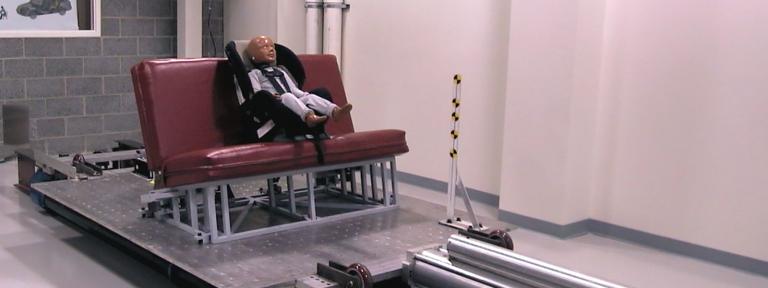
It's your first day on the job and somebody slams a car door on your head, and shoulder, and hip - at 20 miles per hour. For BioSID, the new crash test dummy at Kettering University, it's just another day at work.
"BioSID" stands for Bio-fidelic Side Impact Dummy, a highly specialized dummy with instrumentation tuned for data collection in side impact crash events. BioSID was donated by Autoliv, of Auburn Hills, a Kettering co-op employer and member of the University's Crash Safety Industrial Advisory Board.
He is valued at approximately $65,000, according to Dr. Janet Brelin-Fornari, director of the Crash Safety Center and associate professor of Mechanical Engineering. "Having BioSID expands our research capabilities and opens up opportunities for funded research projects or consulting," she said.
"We were not able to run these types of tests before unless we leased a SID," said Brelin-Fornari. And they are hard to come by, because side impact crash events involve more intrusion into the occupant chamber than front or rear crashes, and the dummies have a tendency to incur damage, she said.
Four Kettering seniors used the crash event Thursday, Sept. 7, as part of their capstone class project for Dr. Massoud Tavakoli, associate professor of Mechanical Engineering. All Kettering students participate in a capstone class that utilizes skills from all classes in their major. The students using BioSID have a Bio-engineering concentration in Mechanical Engineering.
Their project was to compare the results form the crash event with those recorded during a similar event using a EuroSID (the European version of BioSID), and determine any discrepancies in the test dummies.
Ben Kelly, of Sterling Heights, Andrew Payne, of Grandville, Ajay Dagli, of Troy and Todd Wilson, of Freeport, Bahamas, were looking at head acceleration, and the physical loads (force) and rates of deflection exerted on BioSID's shoulder and hip during the crash.
"The goal is to design a car so the affect of a crash event on the internal organs is not traumatic enough to cause major damage," said Payne about their research.
Also on hand to watch the dynamic crash event were representatives from TRW who were on campus to award the Crash Safety Center a grant for $20,000 from the TRW Educational Foundation, to do funded research in rear-impact crash testing.
Using the "regular dummies," those designed for front impact crash testing, the Crash Safety Center will look at specific measurements of load, deflection and acceleration to gather data about the effects of rear impact crashes.
"We are interested in the interaction of the seats and seat belts with the occupants during a high speed rear impact," said Matthew McCann '03, engineer in Systems Performance.
Presenting the check for the funded research were Doug Campbell '74, vice president of Engineering for TRW, Masood Mohammad, group leader in Systems Performance and Biometrics, Charles Steffens, director of Safety Systems Technology, and McCann.
TRW is also a Kettering co-op employer and member of the University's Crash Safety Industrial Advisory Board.
Written by Dawn Hibbard
810-762-9865
dhibbard@kettering.edu